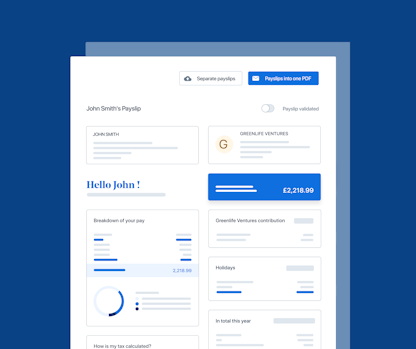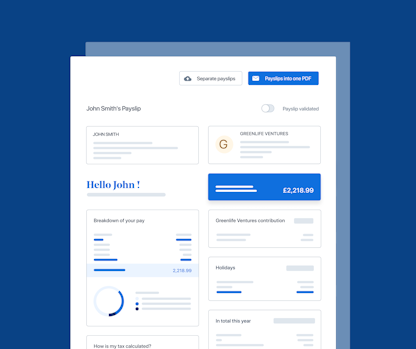- Blog
- |Managing Payroll
- >Payroll legislation
- >Universal basic income UK
Universal Basic Income for the UK: A Good Idea?


Is Universal Basic Income a good idea?
That’s what think tank Autonomy is banking on as it proposes plans to launch the UK’s first-of-its-kind Universal Basic Income (UBI) trial.
Over the course of two years, up to 30 people across the UK could be paid £1600 a month - a sum that isn’t tied to any kind of work commitment or means test. The goal of the trial would be to analyse the impact UBI could have on people’s overall wellbeing, as well as whether or not it could help decrease inequality and poverty.
The subject of Universal Basic Income (UBI) isn’t new, but it’s becoming more and more relevant, especially in the wake of AI. According to a recent report by Goldman Sachs, AI has the potential to replace up to 300 million full-time jobs over the coming decades, displacing hundreds of millions of workers.
But while there are passionate advocates for UBI, there are equally vocal detractors.
Here’s all you need to know about the universal basic income trial, whether it’s a good idea for the UK and the eventual impact a full UBI program could have from a payroll and tax perspective.
What is Universal Basic Income?
Most countries, including the UK, offer citizens a means-tested benefits system. The idea of Universal Basic Income would be to replace some or all of these benefits with a regular, guaranteed income paid out to all citizens. In other words, every adult living in that country would be entitled to receive a set amount of money regularly.
Supporters of UBI say these payments could help eradicate poverty as individuals would no longer rely solely on income from the job market. Payments could also be used towards education and training costs, particularly for children and younger adults starting out.
What is the Universal Basic Income trial in the UK?
Plans are for the trial to run over two years and to draw on a pool of participants from Central Jarrow in the North East and East Finchley in London.
During the trial, researchers will look to understand how money affects these participants’ lives and whether or not receiving additional funds makes a difference to their overall physical and mental health.
A control group will allow researchers to weigh up the experience of trial participants against a group of people not receiving UBI.
How much will people be paid?
The trial proposed by Autonomy will see 30 individuals based in the UK given a monthly stipend of £1600.
Who can apply for Universal Basic Income?
It’s all in the name: Universal. The main models developed so far for UBI all align with the idea of a regular cash payment paid out to everyone in that society.

Universal Basic Income: the pros and cons
What are the pros?
Universal Basic Income has many fans, as many people believe it has the potential to resolve large-scale issues such as poverty and income inequality.
For one, monthly payments would allow people to cover their basic living costs, even if they were suddenly made redundant, helping individuals to stay out of poverty.
They would also give employees more bargaining power. After all, why work at a job you hate and are poorly paid for when you have money to fall back on? Consequently, employers would need to increase wages to attract people and keep them engaged effectively.
UBI could also reduce the prevalence of societal challenges like financial abuse. Partners trapped in unhealthy relationships would be able to leave and survive independently on their own monthly stipend.
Payments could also help children remain in education longer instead of needing to find low-paid work to support their families.
Others even say UBI could help lower crime rates and keep individuals from falling into predatory debt traps.
Of course, one of the biggest drivers for UBI is the potential AI takeover. There’s a lot of apprehension around AI and the possibility that it could render certain job positions obsolete, which is why some are now advocating for people to be paid an unconditional living income.
Finally, UBI could be a great way to simplify and streamline the complicated benefits system, removing the need to apply for benefits and meet specific requirements or means tests.
So, what are the cons?
Of course, every scheme has its flaws, and there are significant downsides to consider. The most obvious is its costs - giving every citizen free cash is an expensive undertaking. It could also cause a significant upswing in inflation, which would counteract all the good generated.
There’s also the potential that people would waste these funds, especially if they have trouble managing money in the first place. They could also decide to opt out of the workforce entirely.
There are also a number of concerns about UBI replacing multiple state benefits. Suppose the entire benefits system is streamlined to provide one simple flat payment per person. In that case, there’s a risk of sidelining people with more specific needs who could greatly benefit from additional funds to cover healthcare or disability costs.
The flip side, of course, is that a high proportion of people already don’t claim PIP payments. In contrast, UBI would ensure every person receives a payment without having to disclose sensitive information (such as illnesses, mental health conditions, or mobility challenges). And this has the potential to ‘destigmatize’ the benefits system altogether.
How much does the UK pay in benefits?
There’s no two ways about it: benefits are expensive to provide. In the tax year of 2022/2023 alone, the UK government spent roughly 231.4 billion pounds on benefits. This is a slight decrease on last year’s expenditure of 234.2 billion pounds.
But how does this compare to other countries? Overall, the UK spends approximately 3.9% of its gross domestic product (GDP) to provide working-age benefits. In other European countries, this proportion is higher, with countries like Belgium spending 6.4% of GDP on benefits. In fact, it was found that the UK has one of the least generous out-of-work benefits systems out of all the Organisation for Economic Co-operation and Development (OECD) countries.
Universal basic income, how might payroll be affected?
Of course, no discussion on UBI (as far as PayFit is concerned least) would be complete without considering the effects on payroll.
For this, we consulted our payroll expert, Rebecca Russell, to get her take on what a UBI program could do to employee compensation, benefits and pay over the long run.
To start, it’s worth thinking about what UBI could do to wages - if everyone receives a cash payment every month, this may lessen the incentive for some workers to put up with gruelling 40 hour a week contracts when they’re on minimum wage and don’t enjoy the work. As Rebecca says: “People are likely to opt for less stressful roles, taking on more meaningful work where they can prioritise their mental health and personal relationships. In other words, opting for more work-life balance.”
Companies that aren’t prepared to raise wages and rethink their packages might find it even more challenging to retain the right people. Offering better salaries, more tailored benefits or simply more opportunities to do more impactful work will be vital to retaining and attracting new talent.
UBI could also affect the number of people who decide to contribute to a pension. “That might mean more people opting out of pensions altogether”, Rebecca shares, “making re-enrolment more time-consuming.” Given this, businesses may need to consider raising contribution rates or making pensions more enticing.
There could also be a considerable migration to zero-hour contracts, with employees seeking out more flexibility in their working arrangements. That, in turn, will make processing payroll more complicated: “For example, calculating holiday entitlement when the employee has no fixed schedule or working out the training costs for two people where the work is usually done by one.”
Higher or more complex tax rates and National Insurance to fund UBI could also potentially decrease the value of money they’d earn from working altogether, leading to a cycle of ever-increasing salaries. Nevertheless, the potential benefits of UBI are compelling.
For more information on how salaries work, find out what’s on your payslip, or why not explore how to manage people, pay and performance in a scaling business?

UK Expenses Management - A Guide For Employers

Overtime Pay Rates & Laws in the UK

The 2024 UK National Living Wage - An Employer’s Guide

The Cost Of Recruitment In The UK - What You Might Not Know

UK National Insurance Changes for January 2024


